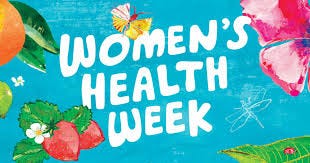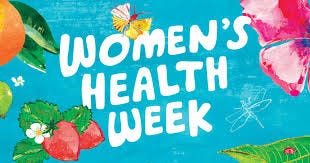#029 Women’s Health Week: Know your body, know your mind
While it would be great to be thinking about our health and mental health on the regular, sometimes we need a ‘week’ or ‘month’ to remind us.
This coming week (2-9 September) is Women’s Health Week in Australia, dedicated to promoting good health and wellbeing in women, girls and gender-diverse individuals.
This year there is a focus on knowing your body, gut health, tips to advocate for yourself with medical professionals, and addressing stigma around health issues.
Interestingly, there isn’t much in the way of mental health and wellbeing on the agenda.
So Well, Well is here to plug the gap!
I think knowing your mind is just as important as knowing your body. And just like we are encouraged to take notice of physical symptoms, like lumps or new moles, we should also take care to notice when something is off with our mental health.
In 2024, around 1 in 2 Australian women (54%) are currently experiencing some form of mental health issue. Worryingly, 1 in 4 women are dealing with a severe mental health issue.
According to the Liptember Foundation, an organisation fundraising and campaigning for greater women’s mental health programs and awareness, in Australia women’s mental health remains at a ‘crisis point’.
The top 5 mental issues facing women in Australia in 2024 are:
· Depression – 46%
· Anxiety and Generalised Anxiety Disorder (GAD) – 41%
· Body image issues – 29%
· Psychological distress – 16%
· Post-Traumatic Stress Disorder – 14%
The Liptember Foundation reports a number of triggers for women’s mental health issues in 2024:
· Low self-esteem and confidence
· Financial stress and pressures
· Family and relationship breakdowns
· Societal and self-inflicted pressures (like unrealistic body image ideals and media/social media influence)
· Grief, death and loss.
Notably, working women are particularly vulnerable, with 2 in 5 stating that their mental health had deteriorated in the past year due to work demands. Among 20-39 year olds the top 3 triggers for poor mental health were burnout, the mental load, and work/family/life juggle.
Given both the spread and severity of mental health problems for women, it is surprising that this doesn’t get more attention – and isn’t a key focus of women’s health week!
For many women, we only reach out for help when things get dire - only 48% of who had experienced mental ill-health sought professional help.
Women’s health week is a great opportunity to remind ourselves – and our family, friends, community and colleagues – of the importance of preventative health not only for our bodies but also our minds.
With mental ill-health on the rise, what are some things we can do to boost our mental wellbeing?
Here are 3 things you can do every day or every week – just make it a regular part of your rhythm – to boost your mental wellbeing.
Learn to meditate and cultivate a mindfulness practice
Ariana Huffington, in Thirve said
What study after study shows is that mediation and mindfulness training profoundly affects every aspect of our lives – our bodies, minds, physical health, and our emotional and spiritual wellbeing. It’s not quite the fountain of youth, but it’s pretty close. When you consider all the benefits of meditation – and more are being found every day – it’s not an exaggeration to call meditation a miracle drug…
There is a growing body of research into the impact of meditation and mindfulness on our physical and mental health. Type ‘meditation’ into Google Scholar and you can see the recent explosion of research. Between 1960-1990 there were 37,100 papers published. Since 2020 there have been around 43,200 papers published. Research has shown meditation and mindfulness interventions have improved anxiety and depressive symptoms.
The benefits of mindfulness have also been studied in healthy populations – or those not suffering from mental or physical illness. In these groups the practice has been found to reduce stress and trait anxiety, while also reducing negative affect and rumination. Mindfulness helped to increase self-compassion and positive affect.
What is the difference between mindfulness and meditation? Both are sometimes used interchangeably, but they are different practices.
Mindfulness is the mental state in which you focus your awareness on the present.
Meditation is a tool we can use to develop a regular practice of mindfulness.
In other words, mindfulness is a way of relating to oneself and one’s environment, whereas meditation is a formal practice meant to alter or enhance one’s state of mind.
Where do we experience mindfulness? In the present moment. Where do we exist most of the time? Not in the present moment!
Instead we are on autopilot, just going through the motions. Think of the last time you drove to work or the gym – do you remember anything about the drive? What about the last meal you ate? At the same time as we are autopiloting, we are often lost in thoughts. The mind is busy either rehashing the past or rehearsing the future.
Why does that matter? Because we miss out on our life because we aren’t paying attention.
You can try out guided meditation or mindfulness practices on apps like Insight Timer, Calm or Headspace. Or even better, learn from a qualified teacher. Just like you could probably learn how to swim or practice yoga from an app, you get a lot more out of learning from a human!
And just like we can go to the gym to build bigger biceps, we can practice meditation and mindfulness to produce positive structural changes in our brains.
But a word of caution - don’t use a meditation or mindfulness practice to replace conventional care or as a reason to postpone seeing a health care provider about a medical problem.
Spend time in nature
Most of us don’t spend enough time outside in nature.
But for those among us experiencing stress and overwhelm, nature is the salve that your tired brain needs.
Numerous research studies have found that interacting with nature has a number of cognitive benefits, with one study finding that natural environments improve working memory, cognitive flexibility and attentional control, while exposure to urban environments is linked to attention deficits.
A 2022 review of 952 studies showed that 98% of nature-based intervention studies improved mental health outcomes. Most of these studies also revealed improvements in physical and cognitive health.
The Japanese practice of forest bathing or shinrin yoku conjures up images of people frolicking naked in a forest (fun, no?) – but actually it is simply the practice of being immersed in a forested areas while paying mindful attention to all five senses. One meta-analysis showed that forest bathing can significantly reduce symptoms of depression and anxiety.'
With the average adult spending 90% of their times indoors (and a lot of time in front of a screen – both at work and at home), it might be time to make a conscious effort to swap screen time for green time to boost your mental health and wellbeing.
Find time for community
Australians have become less sociable and lonelier.
Loneliness is linked with an increased risk of heart disease, high blood pressure, dementia and mental health conditions such as depression and anxiety. You might have heard that loneliness has been found to be is as deadly as smoking half a packet of cigarettes a day, and can increase the risk of death by 26 per cent.
In 1984, Australian adults averaged nine trusted friends. A generation later it had fallen to five. Why has it been harder to make and keep friends? Part of the reason is that we don’t do as many organised activities anymore. In the past, we would have met some of our friends in sporting teams, religious communities and social clubs.
Has anyone else found that as they get older, they don’t have as much time for organised social activities?
I have. Now when I do have free time, I would usually prefer to spend it in solitude. Though I do fondly recall the mixed netball team that I joined when I moved to Canberra many years ago. It was not only good for making new friends and socialising. But it’s also how I met my husband!
Now, I find that I have made new friends at the school gate and at kid’s sport. But perhaps it is time that I get out there and join a new activity, just for myself.
This women’s health week, take time to reflect on how your mental health is tracking – and whether you could do more to help your mental health, either by seeking professional help or thinking about ways to engage in more preventative activities.
Let me know what you are thinking about trying out in the comments below!
Be well,
Alicia






